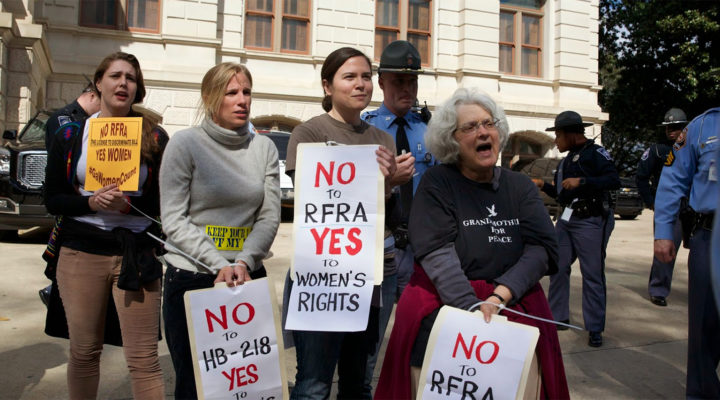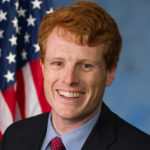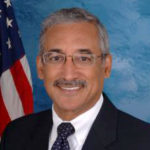Some who 23 years ago worked for passage of a law ensuring broad protection of religious freedom say now the Religious Freedom Restoration Act needs tweaking so it can’t be used to discriminate against others.
Groups including Americans United for Separation of Church and State and the Interfaith Alliance voiced support for the Do No Harm Act, introduced May 18 by U.S. Reps. Joseph P. Kennedy III (D-Mass.) and Robert C. “Bobby” Scott (D-Va.) to amend the Religious Freedom Restoration Act passed by Congress and signed into law by President Clinton in 1993.
The law would clarify that no one can seek religious exemption from laws guaranteeing fundamental civil and legal rights. It comes in response to recent efforts across the country to allow the use of religious belief to justify denying services to same-sex couples because of their sexual orientation.
“The religious freedom promised by the Constitution, the religious freedom envisioned by our founders, is one where every person’s faith is protected and no one’s faith is used to subjugate or harm others,” said Rabbi Jack Moline, president of Interfaith Alliance. “For years the Religious Right has tried to force legislation through Congress and state legislatures designed to turn religious freedom into a weapon used against religious minorities, people of color, women, children and the LGBT community. The Do No Harm Act is a critical first step toward counteracting that misguided campaign.”
Barry Lynn, executive director of Americans United for Separation of Church and State, said his organization joined conservatives and progressives to support the passage of the Religious Freedom Restoration Act in 1993 “because we believed it would protect real religious liberty, especially for those of minority faiths.”
“We are troubled, however, that over the years, RFRA has been misconstrued and exploited to justify discrimination and to deny others their rights,” said Lynn, an ordained minister in the United Church of Christ. “That is why today we support the Do No Harm Act, because it preserves RFRA’s power to protect religious liberty but also clarifies that RFRA may not be used to harm others.”
Holly Hollman, general counsel of the Baptist Joint Committee for Religious Liberty — not one of the groups officially endorsing the bill — said while it can be invoked for any religious claim, to prevail under RFRA the burden on religion must be “substantial” and justified by a “compelling” governmental interest, including the rights of others.
“Recently, RFRA has been invoked in contexts that have drawn attention and raised concerns that it may one day be interpreted to override other important interests in a way that harms others,” Hollman explained in comments quoted by Don Byrd on the BJC blog.
“RFRA does not guarantee the success or failure of any particular claim, nor is it the cause of discrimination,” Hollman said. “Current political and cultural differences are impacting the public’s understanding of religious freedom and challenging our country’s legacy of protecting religious freedom for all.”
Lynn said in a May 18 blog that the first “unexpected and unfortunate” consequence of RFRA came in the form of landlords refusing to rent apartments to unmarried couples, claiming exemption from laws prohibiting housing discrimination on religious grounds.
The “most notorious” application, Lynn said, is the craft store chain Hobby Lobby, which successfully used an RFRA defense to refuse to provide tens of thousands of employees with health insurance that covers contraceptives mandated under Obamacare.
“As someone who worked on RFRA’s passage, I am deeply disappointed that the law is being misused in these ways. We should not allow people to engage in discrimination or the denial of services under the guise of religious liberty. Such an outcome both harms others and ultimately deteriorates this fundamental freedom.”
“As someone who worked on RFRA’s passage, I am deeply disappointed that the law is being misused in these ways,” Lynn said. “We should not allow people to engage in discrimination or the denial of services under the guise of religious liberty. Such an outcome both harms others and ultimately deteriorates this fundamental freedom. I believe it’s past time to get back to the original understanding of RFRA and indeed, real religious liberty.”
The full list of advocacy and expert organizations endorsing the Do No Harm Act: AFL-CIO, American Civil Liberties Union, Anti-Defamation League, Americans United for the Separation of Church and State, Bend the Arc, Catholics for Choice, Center for American Progress, Center for Reproductive Rights, Congressional Equality Caucus, Disciples Justice Action Network, Equal Partners in Faith, Equality Federation, Family Equality Council, Friends Committee on National Legislation, GLBTQ Legal Advocates & Defenders, Gay, Lesbian and Straight Education Network, Guttmacher Institute, Hindu American Foundation, Human Rights Campaign, In Our Own Voice: National Black Women’s Reproductive Justice Agenda, Interfaith Alliance, Lambda Legal, Lawyers Committee for Civil Rights Under Law, Leadership Conference for Civil and Human Rights, NAACP, NARAL, National Abortion Federation, National Center for Lesbian Rights, National Center for Transgender Equality, National Latina Institute for Reproductive Health, National LGBTQ Task Force, National Partnership for Women and Families, National Women’s Law Center, Parents and Families of Lesbians and Gays, Planned Parenthood, Reproductive Health Technologies Project, Services and Advocacy for GLBT Elders, Sexuality Information and Education Council of the US, Trevor Project and Unitarian Universalist Association.







